The Teaching Adventure
Teaching rules and showing off vibes
I’m going to be talking about “design goals” and similar subjects over the few weeks. All these will relate to The Conquest of Chaos. I was very specific about the types of adventures that I wanted in that collection. I love the classic Against The Giants adventures, but they end up feeling a bit “samey” if you play them back to back. Each one is “go on the offensive against a bunch of giants in their fortress”. I wanted to make each adventure feel unique, both from the types of challenges found within, but also in how the PCs explored the areas within. But we’ll start with the first couple adventures, which were intended to be able to teach the game to new players while also still be huge fun for experienced players.
Some adventures are created with the explicit design goal of teaching a game to new players, or even teaching TTRPGs to new players and judges. Creators need to ride a fine line to create an adventure that teaches without being "hand-holding" in an annoying manner. An even finer line to ride is making this adventure still fun for experienced players. I'll point to Portal Under The Stars as a great "teaching module" of a funnel, but also point to Trials of the Trapmaster's Tomb as a bad teaching module for . Not that its a bad adventure, but you wouldn't necessarily want to run it for people who your trying to endear DCC or TTRPGs in general to.
I've written the first two adventures of The Conquest of Chaos explicitly as "teaching modules". DCC has the funnel and leveled play so you essentially teach the game basics (rules and vibes) in the funnel and then build on that once the PCs get proper character levels. So my funnel, Race Against Flame, teaches the basics and my level 1 adventure, Where Demons Roost, builds upon that. Both are intentionally design to to finish in about two or three hours if everything progresses at a "normal pace" for experienced players. That means that in a game with new players or judges that there is plenty of time for character creation, rules questions, and even leveling up characters. Of course, the other adventures are intended to be run in one or more full game sessions so don't think you're getting short changed with game length! As and aside, I will keep spoilers to a minimum here. They'll mostly stick to the premises of the individual adventures and non-specifics.
Race Against Flame is a "point crawl" style adventure that takes place on the plane of fire. The PCs might just think that they died and went to hell. In truth, when their village was ravaged by fire, they were transported here instead of dying. Unfortunately, they begin the adventure already captured and caged by fire giants. They are to be brought to their great city where they are probably going to be sacrificed, or maybe eaten.
The PCs quickly escape and are given cryptic directions as to how to escape. They need to move quickly because fire giants are chasing them the entire time. Each area highlights a different type of mechanic or style of gameplay. The very first "area" highlights skill checks, saving throws, and spending Luck. Area 2 throws combat into the mix, but also rewards PCs who are smart enough to scavenge from the corpses of the dead. Area 3 can be quick, easy, and painless if the PCs allow it to be. But some rather aggressive "fire dwarves" mean that players usually choose combat. But hey, the dwarves have some good loot and maybe someone could steal one of their mounts (probably not, their mounts are hellhounds). PCs then choose one of two paths towards their goal. Each has a unique challenge and reward. All this goes to teach the basics of the game and highlight the things that make DCC and its funnels special.
Where Demons Roost is more of a classic dungeon crawl style adventure. The PCs, having escaped the plane of fire, are investigating a pilgrimage to the sacred Walder Tree. The Walder Tree is an enormous tree (think of a super redwood tree) where a hive of very special bees create a honey that can cure diseases and even corruption. However, the pilgrims have gone missing. There's a few simple quest hooks to get the PCs to do this, but most judges can use intrigue, magic honey, and reward money to get players to do what they want.
I offer a short "random encounters in the forest" travel section to kinda teach that as well, with none of those encounters being flat out combat. It is player decisions that determine if combat occurs there. Once at the tree, the PCs have to investigate it and determine how they want to solve the problem. At first, this means traversal. Do they spot the partially collapsed tunnel dug under the tree or the knot hole high up? Once we pass this point, the PCs must explore a mostly vertical dungeon. There are not too many distinct areas, but this is intentional! Most new judges have a hard time with a big sandbox (a style of adventure that we save for future adventures). Plus, new players will be asking plenty of questions about how their PC works and that can take up game time. By the time that 4-hours pass, they should still have time to complete the adventure!
We have a variety of enemies that act and react to the PCs that display the need to act smartly. The roleplaying opportunities change the course of the adventure depending on the PCs actions. A little healing and some good dance moves (how else do you talk to bees?) will go a long way. Willingness to do a bit of backtracking can also produce good results. Every single one of these elements is trying to teach players procedures of gameplay that will help them in future adventures.
Conclusion
A good teaching adventure offers a bit of all the game has to offer. For DCC, that generally means: combat with weird creatures, exploring a strange environment, roleplaying with weird little freaks, having your PCs end up stranger than when the started, and showing off the dice chain. I definitely feel like Race Against Flame and Where Demons Roost accomplish these things. I hope you all join me in The Conquest of Chaos!
What's your favorite "teaching adventure" for new players?
What Else Is Going On?
Black Mountain
Black Mountain features the high-peaked fortress of Margath, home to the black sorcerer and his mysterious cloaked servants. The adventurers must rescue the Oracle from the clutches of The Master.
The Cult That Never Was
Death Guaranteed Games bring you a zero-level funnel adventure for Dungeon Crawl Classics! A great introductory module for new players to DCC, but easily adapted to campaign play after the death of a beloved character. After all, it starts at a funeral. But that is also where it gets weird.



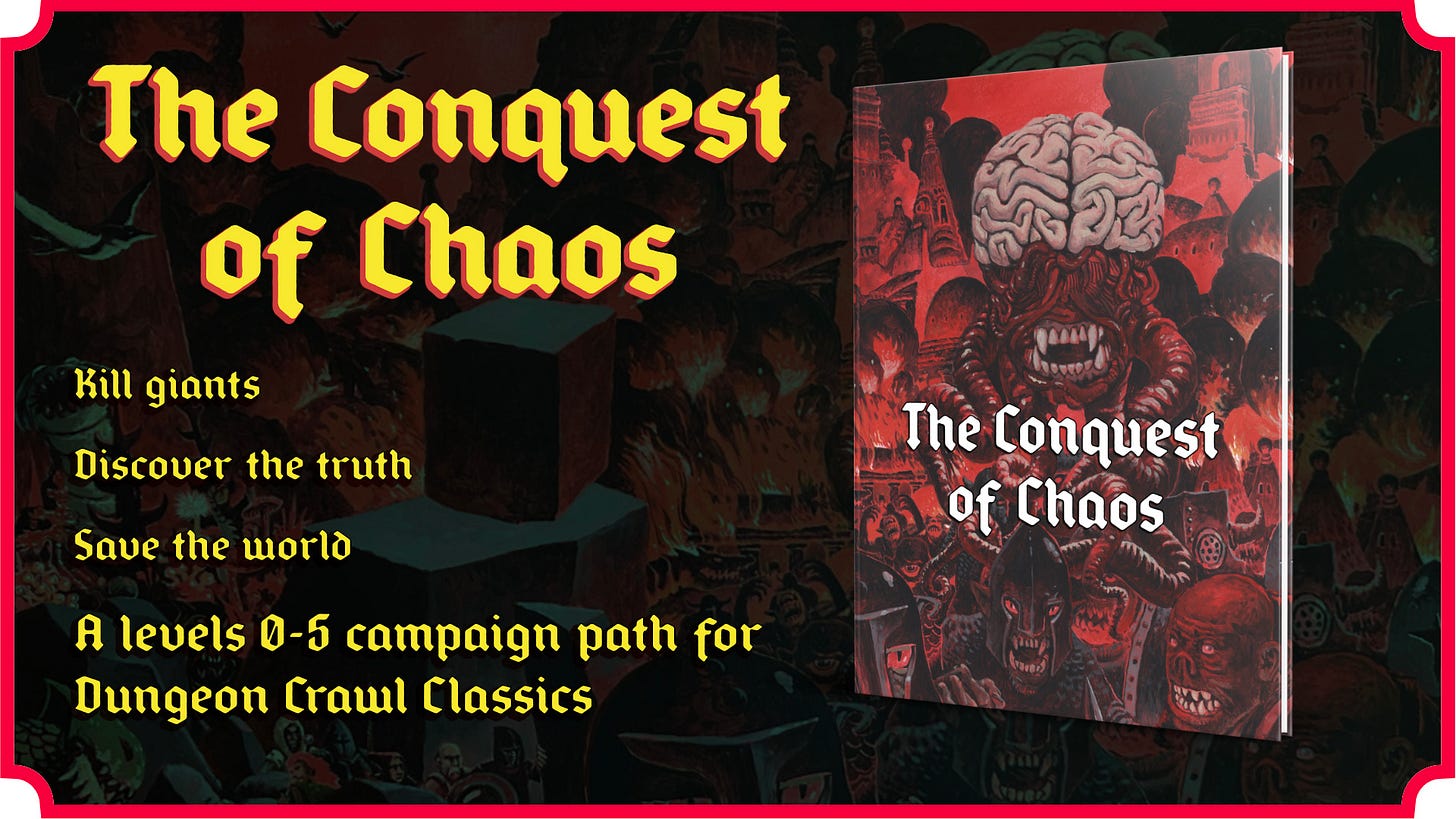
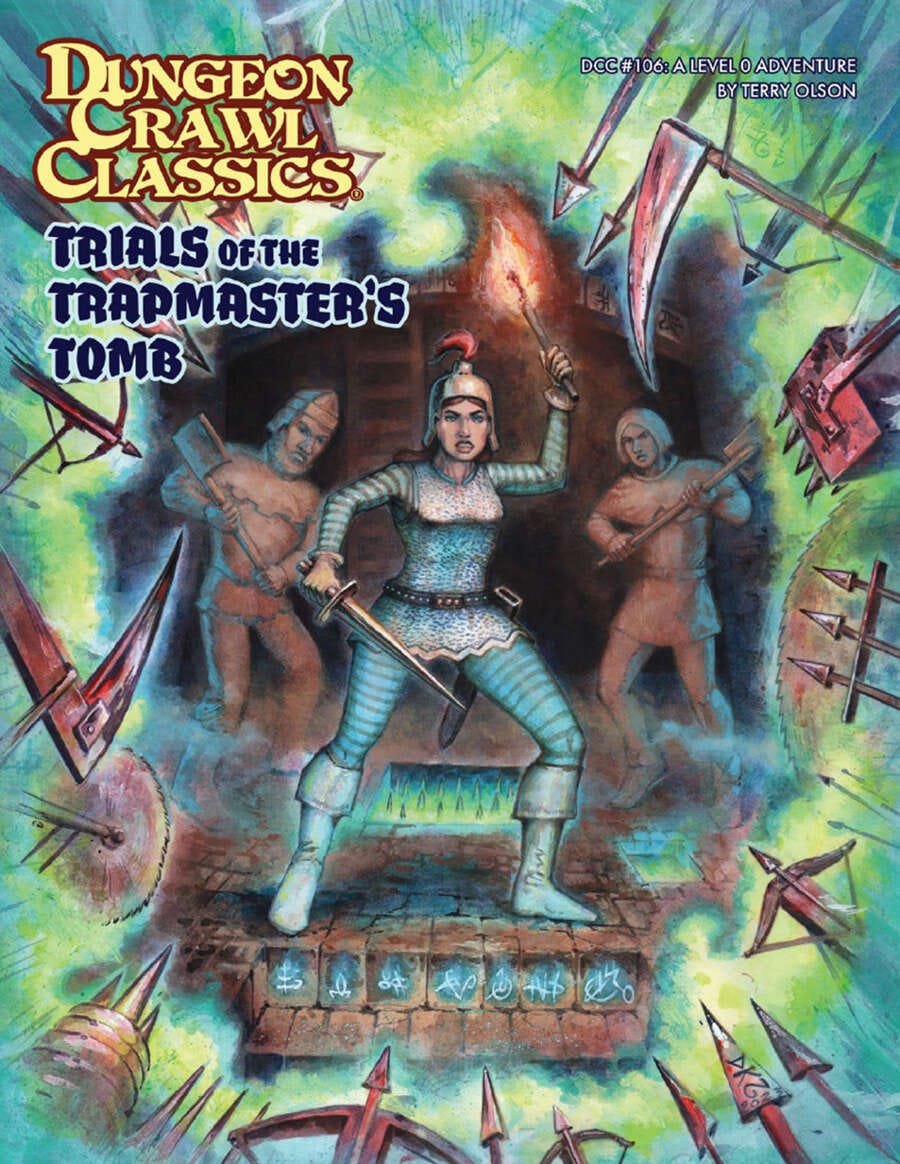
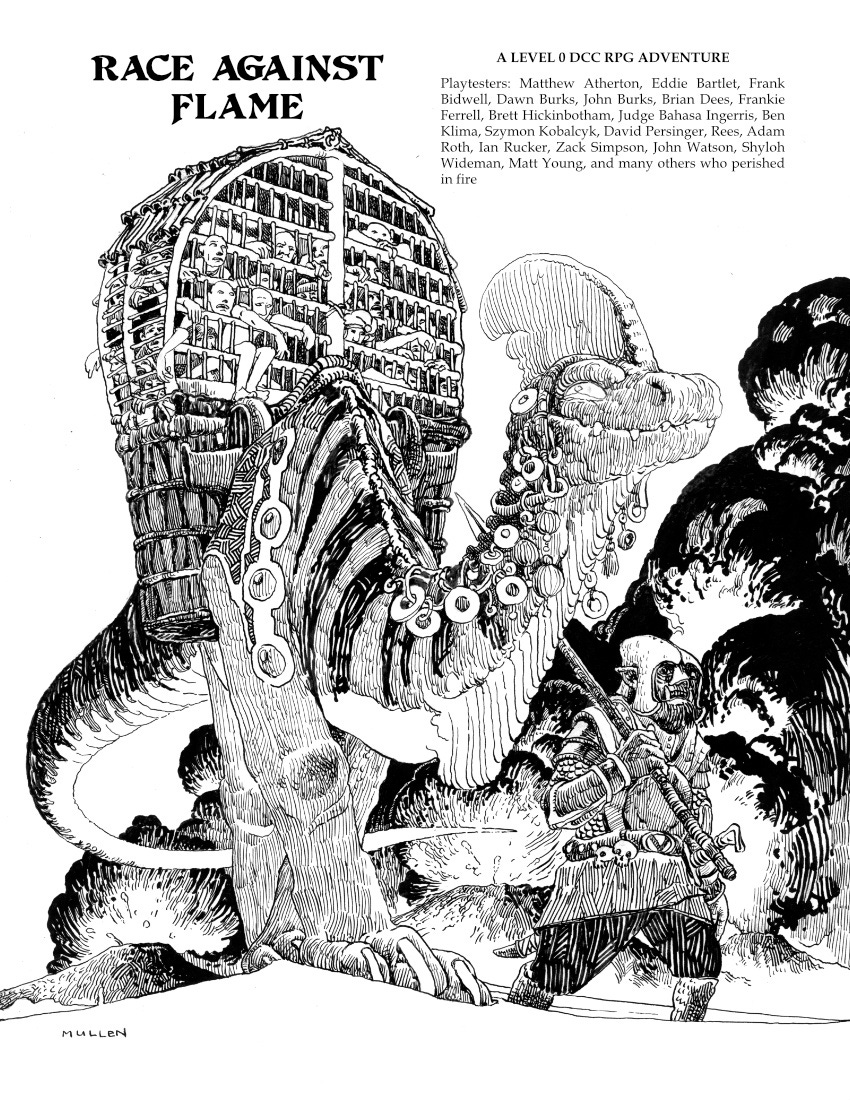
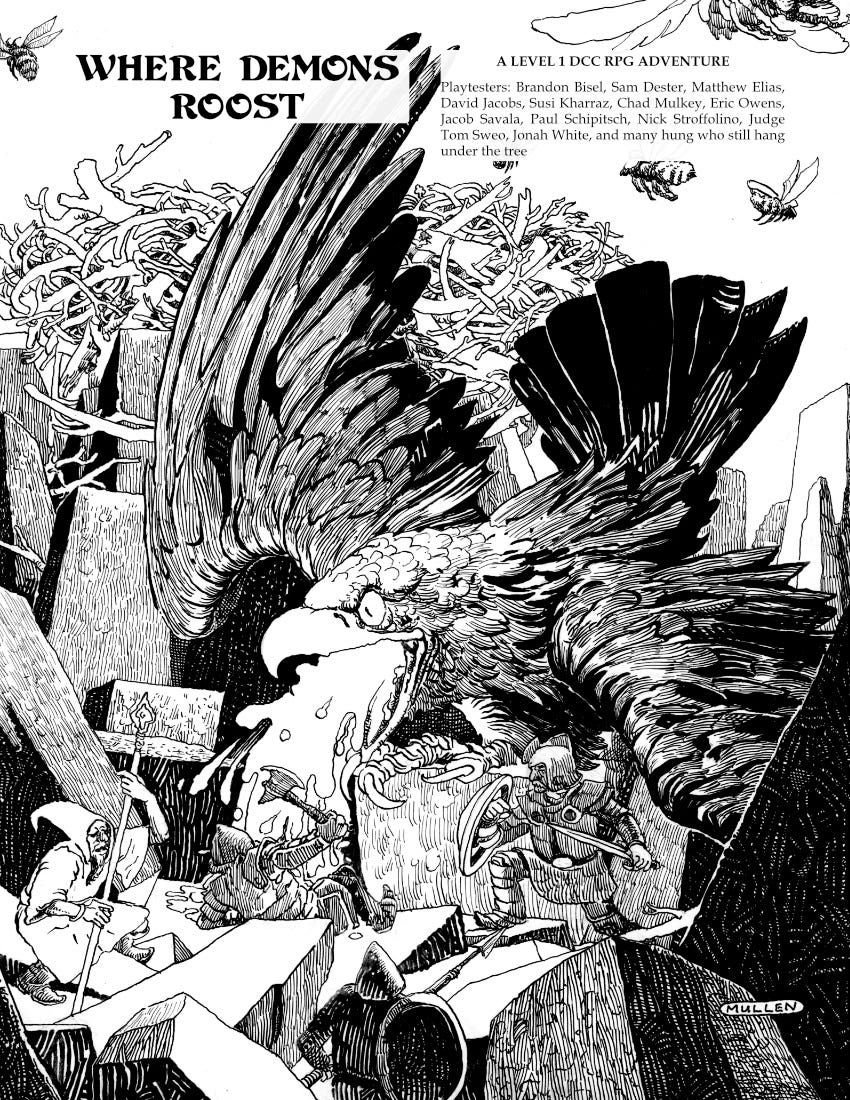

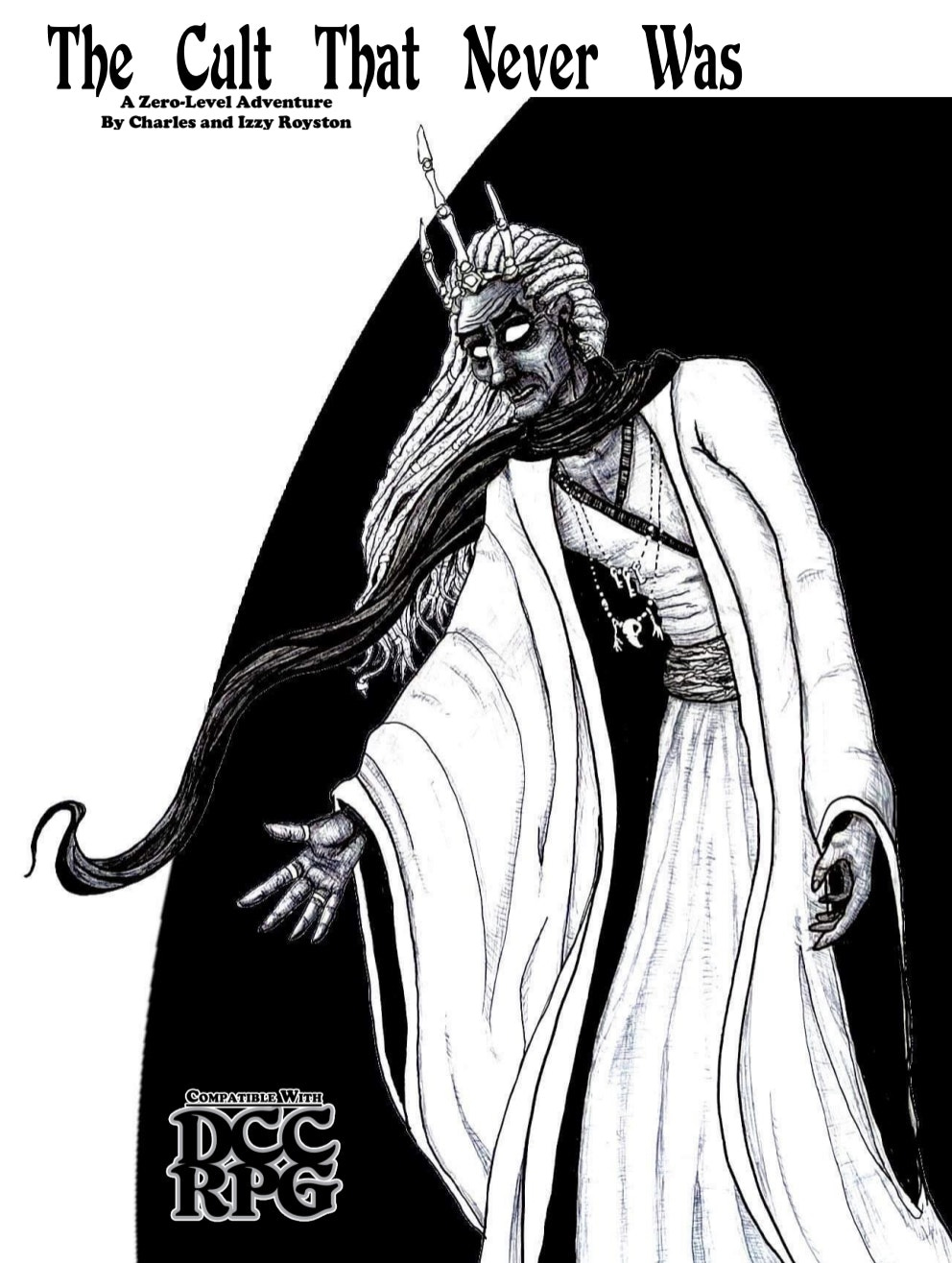
Hi!
It's not an explicit DCC adventure, but what do you think of Skerples' Tomb of the Serpent Kings as a 'teaching adventure'? I've had some very good success using it with DCC to introduce the dungeon crawling concepts...